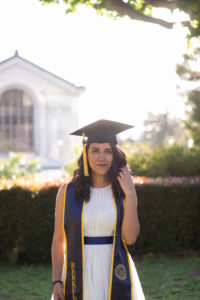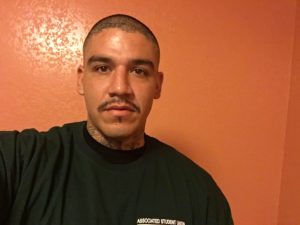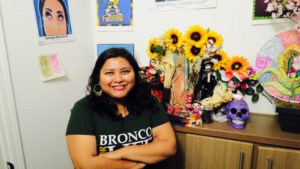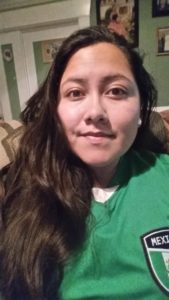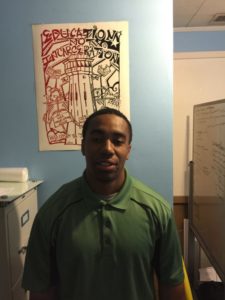Mayra Alejandra Huerta
By Cindy Borbon
Mayra Alejandra Huerta, eldest of five siblings is a 2016 first generation graduated from University of California, Berkeley earning a B.A in Sociology.
Everyone knows her as Alex. When I approached her to inform her that I wanted to feature her in our blog for #ProofPointDay, she was honored and wanted to take this opportunity to thank God, her family, extended family in college, friends and everyone who served as support. She said that the accomplishment belongs to her family just as much as it belongs to her.
Alex’s hometown is in Van Nuys, California, where she attended public schools in the San Fernando Valley, part of LAUSD. Alex’s mother, Alejandra commented on an anecdote, saying, “When Alex was a young child, and from time to time would misbehave like most kids do, I wouldn’t discipline her by taking away her toys. All I had to say was that I wouldn’t going to take her to school the next day , and Alex would quickly give me her full attention and correct her behavior.”
Alex, passion’s for learning came early on, and she read on every subject known to her. By the third grade she was in gifted and honors classes, followed by AP classes in high school. She graduated from Van Nuys High School in 2012 with 4.01 GPA.
The first time Alex was formally introduced to college was in 5th grade. Alex said, “My teacher was and continues to be passionate about education. She set high but reasonable standards for us and although 10 year-old me groaned at the amount of work I was given that year, 21 year-old me is more than eternally grateful now for that.”
It was not until her early high school years that Alex began to plan for her college dreams. Although she was a moderately studious student, she also had a fair share of procrastination on assignments and projects. However, she learned she worked well under pressure and got things done.
When college applications came around, money was a concern as she came from a family with limited resources. However, this was never a huge enough concern to instill fear in her. She had worked hard all through K-12, and money would not hold her back from her aspirations. The majority of her college expenses were covered through grants, financial aid, scholarships, and one or two work-study jobs taken in the last two years. She did take small loans to cover the balance, which she said, were totally worth it.
Alex also learned about resources available once she was in college. She said, “I want all students to know money should never be a reason to settle, there are resources for us. Programs such as EOP (Education Opportunity Program) often give discounts, waivers, and grants to those of minority and/or low-income background. In my university, we had a food storage place where students were allowed to take two boxes of food a month to help alleviate food insecurity.”
I asked Alex to share a bit of her college experience and what she plans on doing next. This is what she had to say.
“I lived in the school dorms for three years, and I recommend living in the dorms for at least your freshman year. It’s a great place to make friends that are also starting off their college career. It also offers great resources, like Resident Assistants (RA) or Health Mentors, that put on programs to help enhance your college experience and make you feel safe, accepted, and prepared to take on your college years.
School clubs are also great ways to not only make friends, but a place of learning and personal growth. I joined Christians on Campus at the beginning of freshman year and stayed with them till the very end. It has given me life-long friends and companions and has shaped and molded me to be the person I am today. Without this club, my college experience would not have been as amazing as it was.
With school, work, clubs, and other extra-curricular activities such as photography and yearbook, it wasn’t easy balancing everything. However, I had an amazing support group of friends and family that encouraged me all the way through. A support group is necessary and even, I would say, vital to finish college.
Kids, it’s possible! Yes, we were given a place in society that isn’t favorable and makes it hard for us to achieve such amazing accomplishments, but it’s not impossible. Break the barriers society has created. If you don’t understand a subject, ask your teacher for help. I promise you that there are still teachers out there who are hungry to see a child wanting to learn. If your teacher won’t help, reach out to your peers, and if they won’t help we live in an amazing age of technology that gives us open access to the many wonders of the world. There are many ways to achieve your dreams, so strive for them, claw your way through if you have to and you’ll get there.” -Alex Huerta
Now that Alex has finished her B.A. she plans to take two years off of work and academics, and she will be joining a Christian post-graduate program called “Bible Truth and Church Service Training” and is often known as the “Full-Time Training.” After that, she is not 100% sure about what she will do, but she is certain things will fall into place and continue to pursue fields she has a passion in, such as business or education. Eventually she plans to join a culinary school and then open a restaurant or bakery.
“I’ve realized that, now, life is full of possibilities and thus I’ll just be chasing my dreams and ambitions.” -Alex Huerta
Adrian Caceres
By Lily Gonzalez
Adrian is a first generation college (FG) student and will be a FG graduate.
His educational journey began in an unlikely place, a California state prison. Tired of counting the bricks on the wall, he picked up his first book. The first book he read cover-to-cover was while sitting on his bunk in his prison cell was a romance novel. From there, he continued to read and his interests grew. However, with the limited number of books floating around, sometimes a bustier popping romance novel was all there was. Nonetheless, this is where his thirst for knowledge was born.
Knowing the power of higher education, he made his way to college. Not many people in our communities have a college degree, and even fewer will go on to pursue one after being incarcerated. That is now changing as more and more of us, the formerly incarcerated, are going on to pursue higher education because we know that it is going to take people like us to bring about any type of change. We have been systematically overlooked and living in the shadows.
Like myself, Adrian also identifies as a formerly incarcerated student on campus. In doing so, you have to deal with all that comes with it including good like support and mentorship. Then there’s the other side to having this history: the stigma, the side eyes. But we also know that there is a much bigger picture. Not only is he a FG, but he is also carving an educational pathway for those like him, those formerly incarcerated students that will follow.
We are banding together with not only other FGs but other formerly incarcerated FGs. Adrian was recently appointed ambassador for the Underground Scholars Initiative, a program aimed to help formerly incarcerated students with resources and information that will increase their academic success.
We have built our own community, our own network. While we are on different campuses, we know we have each other’s support. Motivating each other and hitting up libraries for that free wifi and AC.
Adrian is a member of student government, has hosted and organized panels with formerly incarcerated students, visited several university campuses, and traveled to Washington D.C advocating for students like himself. He’s currently on the Dean’s List and is looking to transfer to an Ivy League. Adrian is formerly incarcerated FG. Two cycles have now been broken.
I am a child of Mexican immigrant farm workers, who originate from a small rural town (Maxela) in Guerrero, Mexico. I have worked in the fields in Mexico since I could walk. While working in the fields, I learned about my culture and family’s traditions in working en el Campo. I distinctly remember the stories my mother told my sister and me. She always reminded me that, like many women who migrated to the U.S. back in the 90s she took the same journey and carried me in her arms while crossing the border. My family made all of these sacrifices so that I could have a better life.
I am a Mexican/Xicana, a first-generation college student who wants to fulfill my dreams of becoming a college professor. I never imagined that living my small town would change my life in many ways.
The first time I left my Mexico, I do not remember because I was too young. My mother crossed the border to be reunited with my father. However, this dream did not last long as we left back to Mexico because it was too difficult for my mother to be apart from her familia. My grandmother was ill, and she decided that she needed to go back home. Therefore, they made the decisions for my mother, baby sister and I to go back to Mexico. I grew up in Mexico without a father because he was in the United States working as farm worker give us a better life and to pay for our education.
My story begins with growing up in a pueblito full of life and cultura. For this reason, it was hard for me to adjust to the El Norte as my family decided to come back to U.S.
I do remember coming to the U.S the second time in 1999. It was not an easy process to leave my hometown. After a few months of our arrival, I began to work en los files de uva in Rancho Cucamonga, California. I worked alongside family members like my Aunt Bertha, picking grapes under the hot sun for long periods. To me, however, this was something normal. From the age of ten until I was thirteen years old, I worked picking grapes for a winery alongside my aunt and sometimes by myself. Being a farm worker provided me with knowledge that gave me the strength to pursue my educational dreams.
Working in the files de uva became difficult once I started school. Therefore, I began to accompany my father en La pisca. I remember his friends asking him, why he made his daughters work in something that was “just for men.” I remember him responding, “They need to learn about the type of work I do, in order for them to appreciate their education.” In addition, my father always told me the story of his boss’s daughters who also worked in the pisca de naranja and how that experience motivated them to pursue a higher education. As a result, they worked very hard in school to better themselves. All these teachings and lessons of the campo taught to me by my father have made me appreciate my own education. As a mujer, I have to face many barriers, but I believe that there are strengths that I have learned in the campo from my parents, family and community. Therefore, I now share how this Mexicanita has made it into higher education because I value my experiences as the daughter of Mexican farm workers, mis padres Maria Eva Mata and Santos Lopez.
Martha Martinez
I am Martha Martinez, a queer woman of color. I was born in Los Angeles and raised on the brink of Koreatown and Mid-City. I attended Los Angeles Senior High School, and I was fortunately placed in Honors and AP courses. My teachers and my parents expected me to attend college. However, no one in my family had attended a four-year university before. I chose to attend California State University, Northridge (CSUN) after attending the Chicano Youth Leadership Conference, which had college student facilitators who shared their positive experiences at CSUN.
At my high school, I was tracked as a college bound student so my academic and college counselors explained the requirements. The requirements to attend CSUN included the A-G requirements and taking a placement test that my parents drove me to at California State University, Los Angeles (CSULA). Although my parents didn’t know the requirements to apply to college, they were supportive in any way possible. As a first-generation college student, I applied to the Educational Opportunity Programs (EOP) at CSUN and had an interview that my parents drove me to. It was through the support of teachers, counselors, and my parents that I was able to make it to CSUN.
Once I was at CSUN and through programs like EOP, I was placed into developmental courses that helped me place into college level writing, reading and math. At the beginning, I was shocked that I did not place at college level writing, reading and math because I thought my high school had prepared me for college. Although I was placed into developmental courses, my professors constantly reminded me that this was just a stepping-stone that would refresh my reading, writing and math skills. I am grateful that I had to take these courses at the beginning of my academic experience at CSUN because the skills I learned and developed were important in my other courses.
In my third year at CSUN, I had to take a statistics course, and I failed it. As a first-generation college student, I did not want to ask others for help because I thought that I could do things on my own. I attended every class session and completed all the homework assignments. However, I did not do well on tests. This was the first “F” in my academic experience, and I felt like I had let myself down. I was determined to pass the statistics course so I re-enrolled in the course. I studied, completed group assignments, and met with the professor when I didn’t understand the material. I learned that even though I failed a class, it was not the end of the world. I also learned that there are resources on campus that I need to access when I need help.
As a first-year college student, I didn’t think of the many possibilities of being employed outside of foodservice because I was experienced in the foodservice sector. My third year at CSUN, I heard about Supplemental Instruction where I would have the opportunity to be an Instructional Student Assistant in a classroom of 20 students who placed into developmental English courses. I applied and with the recommendation of Professor Valadez and Villela, I got the job. This was more than an employment opportunity because this became an opportunity for personal growth. Furthermore, I had the opportunity to not only teach but also learn from students. Through Supplemental Instruction, I learned to value the skills I have developed through my educational experience at CSUN.
As a first-year college student, it was difficult to choose one major when many disciplines interested me. The disciplines that interested me included: Gender and Women Studies, Sociology, Chicana and Chicano Studies, Central American Studies, and Art. My third year at CSUN, I chose to double major in Sociology and Chicana and Chicano Studies. Sociology interested me because I learned about sex, gender, feminism, local and global issues. Chicana and Chicano Studies brought a people of color perspective to my educational experience. In addition, it was through Chicana and Chicano Studies being interdisciplinary that I could connect my research interests in gender, feminism, and art.
As a first-generation college student, mentorship has played a key role in my success. My mentor, Yreina Cervantez played a key role in supporting my interest in art. She was my academic mentor while I was part of the Ronald E. McNair Scholars Program at CSUN where I had the opportunity to develop two original academic research papers. Professor Cervantez’s continuous support has made me confident in academic spaces. It is through her mentorship and friendship that I have learned to bring together academia and art. Cervantez’s support through her mentorship was important in my academic experience as a first-generation college student.
First-generation college students like myself might not have the cultural capital to navigate higher education, but we have community cultural wealth that helps us navigate spaces like institutions of higher learning. According to Dr. Tara Yosso, “community cultural wealth is an array of knowledge, skills, and abilities and contacts possessed and utilized by communities of color to survive and resist macro and micro-forms of oppression.” It was through contacts such as friends, academic counselors, college counselors, professors, and mentors, knowledge, skills, and abilities that I was able to navigate through CSUN despite macro and micro-forms of oppression. Despite the challenges I encountered, I am a first-generation college graduate (FG).
I used to regret all the mistakes and unpleasant experiences in my past, but I don’t anymore because, upon a reflection, they gave me my purpose in life and made me who I am today. In 2012 I was given the opportunity to be a community organizer, researcher, and policy advocate in Richmond, CA for the Safe Return Team. The same year I helped organize and lead a campaign that prevented a jail expansion in Contra Costa County, and redirected public funds towards services and resources that were geared towards serving formerly incarcerated peoples. I also had the opportunity to lead the Ban the Box campaign in Richmond, where we successfully advocated for an ordinance change that required the City and its vendors to remove the discriminating question about felony conviction history from employment applications. After transferring into UC Berkeley I joined the Underground Scholars Initiative and co-lead a successful campaign that addressed the same issue with UC Berkeley’s hiring policy. It was these events that motivated me to study law and public policy. This past March I was discharged from parole after serving five years and I was also accepted into Goldman’s School of Public Policy, which is ranked the number one graduate program in Public Policy. Before I was released from prison the Warden told me I would return. But he was wrong. Now I stand, as living proof that formerly incarcerated people can be role models and assets to their communities.
We are all in this together with you. We want to be a resource for you and for all of the children you love. Whether you need some info or you have info to share, you know where to go…LA Comadre.
Latest posts by La Comadre (see all)
- Cómo está Regresando la Escuela de un Salón - July 28, 2022
- ¿Se Debe Exigir a los Estudiantes recitar el Juramento a la Bandera? - June 10, 2022
- 5 Aplicaciones de Salud Mental y Bienestar para descargar ahora Mismo - May 5, 2022
- How the One Room Schoolhouse Is Making a Comeback - May 5, 2022
- El Dinero Importa: Donación de $ 1 millón a Programas de Educación Financiera en LAUSD - April 25, 2022


